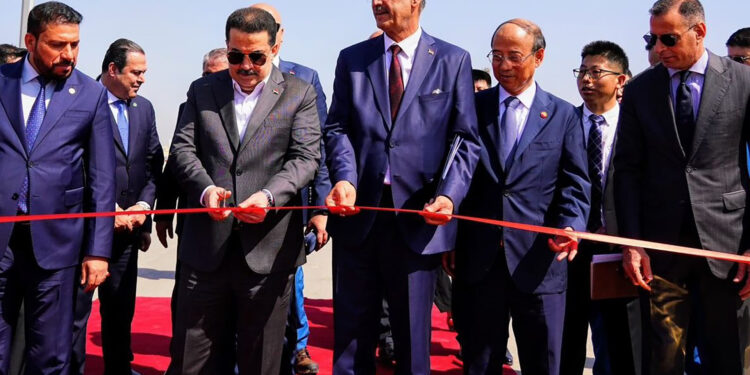Today, Saturday, Iraqi Prime Minister Muhammad Shiaa Al-Sudani opened the associated gas processing project in the Halfaya field in Maysan Governorate (400 kilometers southeast of Iraq).
The Prime Minister’s Media Office stated, in a statement today reported by the Iraqi News Agency (INA), that “the Prime Minister opened the associated gas processing project in the Halfaya field in Maysan Governorate with a capacity of 300 mqmq (million standard cubic feet/day).”
Iraq’s gas reserves are estimated at about 127 trillion cubic feet, according to data published by the Iraqi Ministry of Planning last year.
The Minister of Oil, Hayan Abdul Ghani, considered that the gas processing project in the Halfaya field represents an important addition to supporting the energy sector in Iraq.
Abdul-Ghani said that the project represents an important addition to the industry and investment of gas associated with the operations of extracting oil, stopping its burning, and converting it into useful energy that supports the energy sector in Iraq, noting that the project was carried out through the efforts of the joint management of the Halfaya field, which includes the Chinese PetroChina Company and the Maysan Oil Company, which committed The Ministry’s plans and programmes.
He stated that the goal of the project is to desalinate and dry the gas, and then separate its basic components to obtain the following products:
- Dry gas is used to supply the national network to operate electrical power production stations in the governorate, namely the Amara government station and the Maysan investment station to generate more than 1,200 megawatts, according to the available capabilities and energies.
- Production of liquid gas, which is used as cooking gas and car fuel, with an initial capacity ranging between 1,100 and 1,200 tons per day.
- The project contributes to the production of “gas condensate” with a production capacity of up to 20 thousand barrels per day, which is mixed with the crude oil produced to improve its marketing specifications.
- This project contributes to the production of sulfur as a by-product of gas processing operations, with a capacity of 20 to 40 tons, where the sulfur is marketed through the Iraqi Oil Marketing Company (SOMO).
He pointed out that this project will contribute to stopping gas burning and preserving a clean environment, as this forms part of the commitments of the government and the ministry and their tireless efforts to support associated and free gas investment projects and renewable energy.
Iraq is the second country, after Russia, that burns associated gas the most. Since the start of oil production in the world, the burning of gas released during the extraction of crude oil has begun. Oil companies burn gas because it is less expensive than processing and selling it, but this burning gas is a major source of air pollution and greenhouse gas emissions.
In Iraq, which imports large quantities of gas to operate electricity generators, processing gas may contribute to putting an end to the chronic energy problem, and the wasted quantities, when treated, can provide electricity to more than 3 million homes in Iraq.



